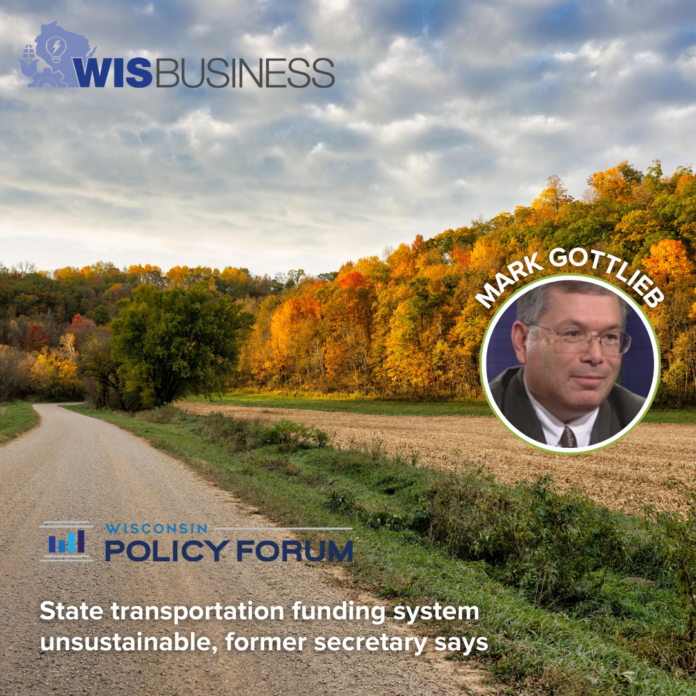Wisconsin’s current transportation funding system is unsustainable, according to a former state transportation secretary.
Speaking during a recent Wisconsin Policy Forum panel, former Department of Transportation Secretary Mark Gottlieb argued any state transportation funding structure should be adequate, sustainable and equitable “across different user types” and socioeconomic groups.
“The system that we have right now probably is failing in all three of those areas,” he said.
He referenced findings from a recent WPF report that found transportation funding in Wisconsin hasn’t kept up with inflation for road construction costs over the last three years. While road construction costs rose 56.8% nationally from 2020 to 2023 and state costs increased 26.6%, state transportation spending increased 5.3%.
Gottlieb, who served under former Gov. Scott Walker, said the state’s transportation funding formula isn’t structured to grow to meet changing needs. The discussion highlighted the effects of inflation as well as how hybrid and electric vehicles are affecting gas tax revenues.
“I think a lot of people feel the gas tax is dead, and I would say that reports of its death are greatly exaggerated,” Gottlieb said.
Meanwhile, Wisconsin Transportation Builders Association Executive Director Steve Baas said the state’s transportation funding system can support “a good system of local roads, or a good system of backbone highways” but not both.
“Being the last hostage shot is not much of a strategy. But that’s the strategy we are forcing WisDOT to take on right now,” Baas said. “It doesn’t have enough funding to do both … It can’t be an either-or. This is about the vision we have for Wisconsin’s future economy.”
He said the state agency is now in an “almost untenable position” where it has to adopt an asset management plan that’s “not the most cost-effective in the long-run,” calling it a fatal flaw in the funding system.
Tracy Johnson, president and CEO of the Commercial Association of Realtors Wisconsin, raised the issue of expensive debt service on transportation projects, noting “the longer we wait, the more expensive it gets.”
“We are seeing this play out right now with the delay in the I-94 east-west corridor,” she said. “This project started out at probably half of what it was in the early days, so the cost to that is becoming very counterproductive.”
The discussion also touched on how to limit growth in project costs. While the WPF report notes Wisconsin’s road construction costs haven’t risen as much as the national level, Gottlieb said the state “has not been a leader” in innovating project delivery. That covers contracting for projects, managing risks between contractors and owners, and other factors.
“They’ve made some positive steps, but it’s been very slow,” he said. “And I would say, frankly, I mean we’re probably 10 or 20 years behind some of the more innovative states, in terms of how they deliver projects.”
While he acknowledged lowering costs isn’t a “silver bullet,” he said making changes in this area would help accelerate projects and better manage costs and risks.
Baas offered several ideas for generating additional revenue “right now,” including adding an inflationary component to the state gas tax and increasing registration fees. He also pointed to ideas for incorporating “vehicle miles traveled” or weight-based categories for registration.
“Those would have some administrative hurdles to cross, and probably don’t generate you that much immediately, but are worth looking at in the longer term,” he said. “That also would accommodate … how you capture revenue from alternative-fuel vehicles more effectively and fairly.”
Further out, he called the possibility of generating revenue through tolling an “intriguing thought,” but added “that’s not something that we’re going to be able to turn the switch on anytime soon, if at all.”






